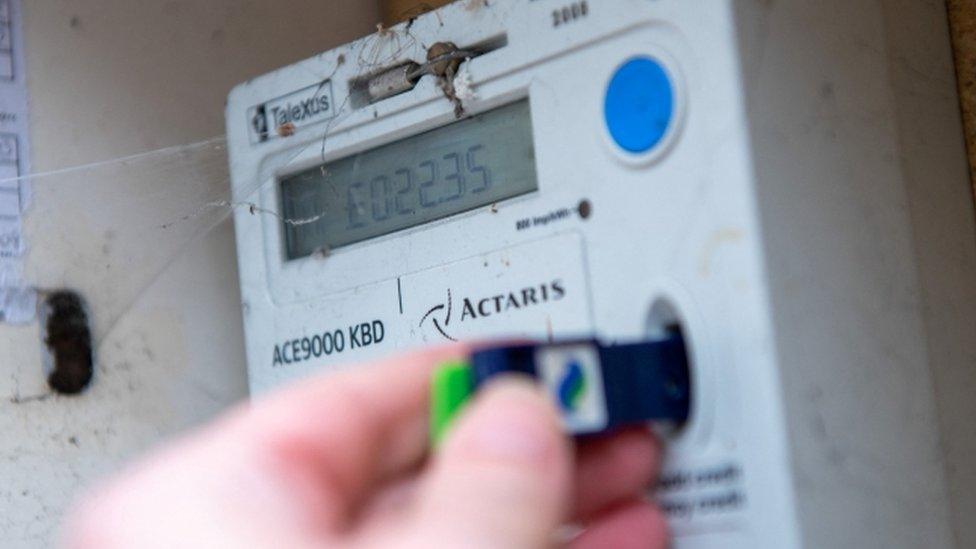Prepayment meters: Magistrates told to stop allowing forced installations
- Published

Magistrates courts in England and Wales are to stop hearing and ruling on applications from energy firms to forcibly install prepayment meters with immediate effect.
One of the country's most senior judges said the cases must be halted in light of the growing concern.
It comes days after the BBC revealed that courts have been waving through applications to install these meters.
Regulator Ofgem has asked all companies to suspend forcible installations.
Monday's order from Lord Justice Edis, the judge who oversees the workings of all courts, now makes both a practical impossibility as it instructs each centre to stop listing the warrant applications until further notice.
Lord Justice Edis said all magistrates had to "act proportionately and with regard to the human rights of the people affected, [in] particular any people with vulnerability".
A warrant officer, who has applied for prepayment meter warrants on behalf of energy companies for two decades, told BBC Newsnight he welcomes the decision but claims it has been a serious concern for years.
"Robert", who is not being identified as he does not want his employer to know he has spoken to the media, says: "In 2015, we would apply for a warrant in person at a local court with 20-30 applications.
"I would find cases where there were vulnerabilities and draw the magistrate's attention to that and they would then refuse the warrant. None of that exists anymore."
Robert says bulk applications started being introduced followed by a new online and telephone system for magistrates from 2019.
"I have seen 200-300 applications submitted in one go, but I have colleagues who have emailed spreadsheets containing thousands of addresses which are then processed in around 15 minutes," he explains.
Lord Justice Edis said that while energy firms could still make a case for a warrant to be heard, they would have to first satisfy a court "in detail as to the integrity of their procedures, in particular relating to the vulnerability of occupiers".
He has not put a limit on how long the moratorium will last for, but said that its lifting would depend on investigations by Ofgem and the government.
Peter Smith, director of policy at the fuel poverty charity National Energy Action, said magistrates' courts had been "far too quick to rubber stamp batches of warrants, with little or no scrutiny."
"It provides some relief that magistrates are now aware of the significance of their actions and not blind to the terrible impacts to vulnerable people if they are forced onto prepayment meters against their will," he added.


This weekend, the leaking of advice from England and Wales' top magistrate to the BBC showed that courts were being told that challenges to energy companies mass claims for such warrants were "irrational" and questions previously asked were "now disproportionate".
The crux of the issue is that energy suppliers assurances "under oath" especially that none of the customers listed were vulnerable, were taken in good faith.
But charity campaigners contend that the energy companies' systems are not correctly identifying vulnerable customers, the elderly, those with very young children, and those with disabilities.
While today's move should create some relief for some customers, it does not solve the fundamental problem.
The deployment of prepayment meters was meant to be an alternative to rarely used sanction of disconnection. If that is not an option, there are concerns that bills simply will not be paid at all. This may all end up eventually, back at the door of government.

Last week, the Times newspaper found that debt agents for British Gas had broken into vulnerable people's homes to fit meters.
Chris O'Shea, chief executive of British Gas's parent company Centrica, said he was horrified at the findings, and the firm said it would suspend forcefully installing prepayment meters until at least after the winter.
Business Secretary Grant Shapps said on Sunday that Ofgem had allowed itself to have "the wool pulled over their eyes" over prepayment meters being force-fitted, taking companies "at face value" instead of listening to customers.
He has given energy firms until Tuesday to report back on what action they will take, potentially including compensation, in response to complaints from any customers who have had prepayment meters wrongfully installed.
In the House of Commons, Energy Minister Graham Stuart said he had met with the boss of Ofgem and said the government expected "strong and immediate action where suppliers fall short of their obligations".
But Ed Miliband, shadow secretary of state for climate change, said the response was "simply not good enough", and accused the government of "sitting on their hands and being far too slow to act".
"Ofgem did reviews in September and November and highlighted the problem - where was the government? In early January Citizens Advice reported that three million people had been disconnected by the back door," he said.
- Published4 February 2023

- Published3 February 2023

- Published3 February 2023
